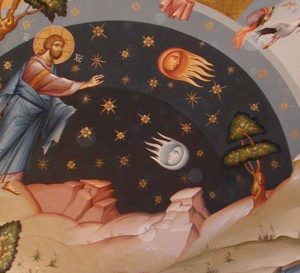19 June OS 2017: The Fourth Sunday after Pentecost; Fourth Sunday of St. Matthew; Holy Apostle Jude, St. John (Maximovich) of Shanghai and San Francisco
The Gospel reading for this Fourth Sunday of St. Matthew recounts the Lord’s healing of the centurion’s servant.
At that time, when Jesus was entered into Capernaum, there came unto him a centurion, beseeching him, And saying, Lord, my servant lieth at home sick of the palsy, grievously tormented. And Jesus saith unto him, I will come and heal him. The centurion answered and said, Lord, I am not worthy that thou shouldest come under my roof: but speak the word only, and my servant shall be healed. For I am a man under authority, having soldiers under me: and I say to this man, Go, and he goeth; and to another, Come, and he cometh; and to my servant, Do this, and he doeth it. When Jesus heard it, he marvelled, and said to them that followed, Verily I say unto you, I have not found so great faith, no, not in Israel. And I say unto you, That many shall come from the east and west, and shall sit down with Abraham, and Isaac, and Jacob, in the kingdom of heaven. But the children of the kingdom shall be cast out into outer darkness: there shall be weeping and gnashing of teeth. And Jesus said unto the centurion, Go thy way; and as thou hast believed, so be it done unto thee. And his servant was healed in the selfsame hour. – Matthew 8: 5-13
St. Theophan the Recluse remarks that the essence of the centurion’s faith “…is that he confessed the Lord to be the God of all things, the all-powerful Sovereign and Master of all that exists (Thoughts for Each Day of the Year, p. 137).” By his stated conviction that the Lord Jesus could command the healing of his servant by a simple command and from wherever He happened to be, the centurion is acknowledging Him as God Who is everywhere present, creating and sustaining all things by His word. The centurion, though a pagan, has been enlightened by God’s Holy Spirit to know – not abstractly but from the heart – what it means that God is the Creator and that he is a creature, and that this teacher Jesus from Nazareth is that selfsame God become a man. Moreover, because he assumes implicitly that the God-Man would be willing to help him, he is confessing that God loves men. What a beautiful and perfect faith!
How can we acquire such perfect faith? It starts when we realize what it means to be a creature and therefore to have a Creator. In his acceptance speech when nominated to the episcopate, the late Archbishop Theophan of Poltava made a simple, powerful statement which expresses this clearly: “Only a few years separate me from the abyss of non-being from which I came.” Think about it: There was a time when I was not, when I did not exist. That I exist at all is due solely to the will of God, the only self-existent being, Who has absolute sovereignty over all things, on Whom I depend absolutely at every moment.
This one thought, that I am a creature and that God is my Creator, has inexhaustible divine power to motivate me, containing both a consolation and a command. This thought consoles me inexhaustibly, for at every moment it reminds me that I am in the hands of a loving Creator, Who is arranging all things for me. I do not have to be my own god. This thought also implies a constant command, for, knowing that I have a Creator, I unavoidably conclude that I must seek to know and to do His holy will.
What freedom!

